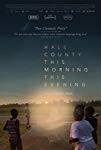Eye For Film >> Movies >> Hale County This Morning, This Evening (2018) Film Review
Hale County This Morning, This Evening
Reviewed by: Amber Wilkinson

When we think of our lives, it's often in snapshots, a memory here, a recollection there - for every birthday or landmark, a thousand other instances where we just went about our business of the day. All of us, of course, experience grief and joy along the way but our lives have a tendency not to 'lead' to these moments in the way of a narrative feature film.
RaMell Ross' documentary achieves a delicate, poetic sweep as he takes a similar approach to the lives of two young African-American men, Quincy and Daniel, along with their immediate family circle. Shooting them over a period of five years, when he was also coaching basketball in Alabama's Black Belt, his film is comprised of often fleeting moments - a toddler charging about, burning off energy as though life depends on it, smoke from a tyre fire pluming up against a tree at sunset or determined hoop practice on a court. Tragedy and elation feature, bubbling up unexpectedly as they might in life rather than in the carefully constructed 'journey' fashion documentarians often aim for.

By looking at what would lie outside of the traditional framework of most documentaries, Ross builds a much more absorbing picture of people fully embedded within an environment. This is not just about Quincy and Daniel, but about the shape and texture of their lives.
Although apparently having no set narrative trajectory, interstitial questions that appear occasionally invite a deeper consideration of race and racism. "What happens when all the cotton is picked?" asks one, while another enquires, "How do we not frame someone?", the word "frame" heavy with possible interpretations. History and perception also have a place here - at one point the camera's careful approach to a plush looking plantation house is intercut with archive images of Bert Williams, a black vaudevillian who wore 'black face', peering from bushes - the effect lingers, like much in the film, asking each viewer what we are ourselves bringing in terms of mental baggage to the film and what the past leaves in the present. And while no traditional arc is present, there is a cumulative effect to these images, one that registers as much as an emotional energy than as concrete 'fact'. Ross celebrates determination without resorting to pat cliche, choosing evocation over illustration and leaving us to feel as much as see the lives of this community.
Reviewed on: 16 Dec 2018

















